Play The Broadcast here.
The Broadcast is an interactive fiction game where players step into the shoes of a college radio host in a town hit by a hurricane. The game focuses on the delicate balance between gaining public trust and managing corporate influence while uncovering the hidden stories that shape the town’s fate.
This idea came from a desire to hold corporations accountable for their destructive outputs and acknowledge the power of media in influencing public opinion. The narrative combines themes of environmental responsibility and media ethics, inspired by the rising importance of individual voices in driving societal change.
History and Versions of the Game
The Broadcast started as a personal story of a college student returning home to find their home destroyed and traveling to the forest to uncover a dark family secret: their parents were influential figures in a powerful oil corporation. It was originally called Beneath the Canopy.
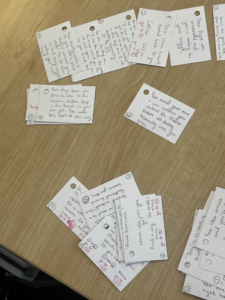
However, the narrative evolved, shifting the focus to the student becoming a late-night radio host. This pivot allowed for a broader exploration of the media’s role in society while still emphasizing themes of environmental accountability and personal growth. My original idea focused more on the supernatural, but I wanted to take a more direct approach to the causes of climate change. This shift allowed for an exploration of media’s power in shaping societal narratives while maintaining the core themes of environmental responsibility, corporate accountability, and personal growth. The transition from a personal quest to a community-driven narrative through The Broadcast was driven by playtesting feedback and the desire to create a more interactive and impactful experience.
- Version 1: Focused on the college student’s personal journey and the family’s dark secret in paper format. Playtesting revealed a need for broader engagement with the community’s story and more engagement with supernatural elements. Causes of environmental destruction not clear until ending reveal: a bit ineffective.
- Version 2: Still focused on the college student’s journey, but in Twine format now. They have a gender-selectable best friend and can make choices to discover more about their family’s involvement.
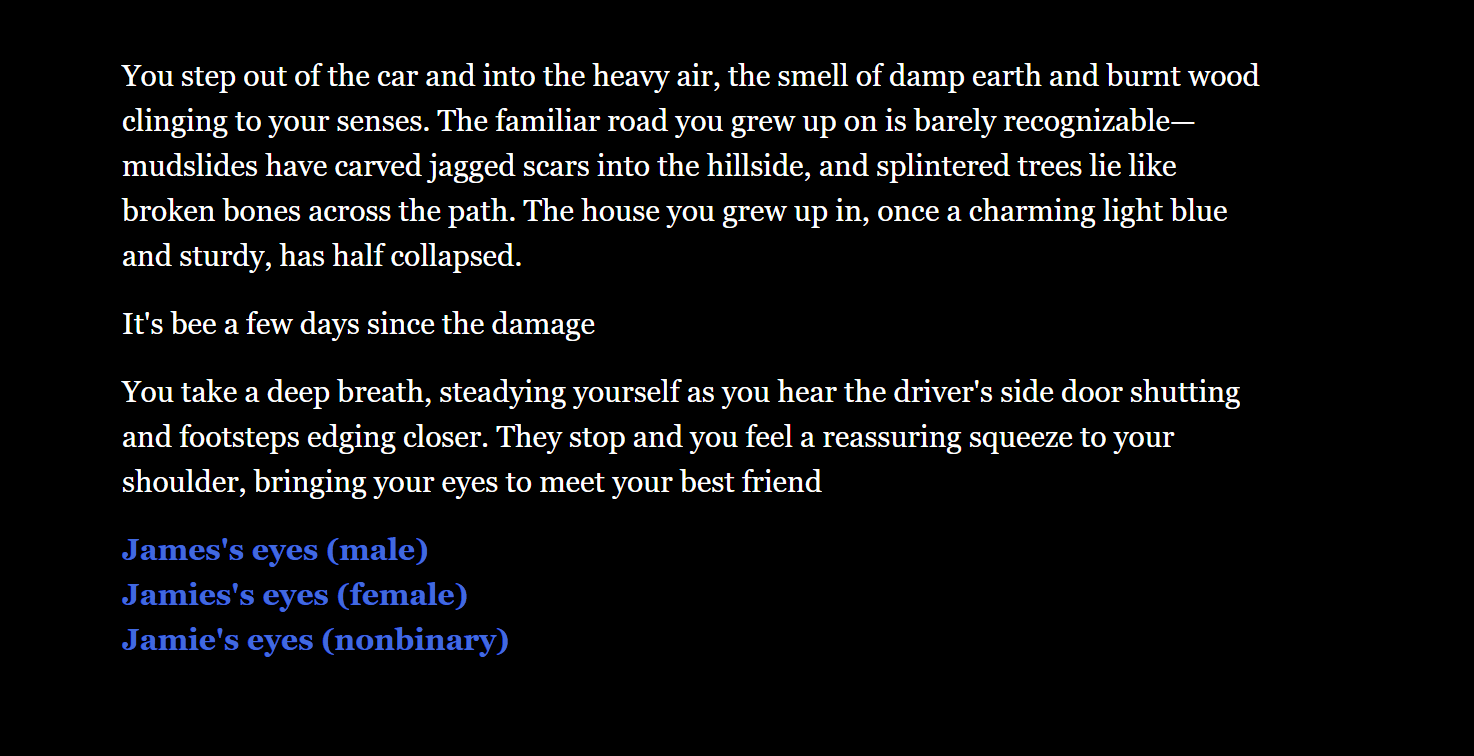
- Version 3: Pivoted to the radio broadcast format, allowing players to influence public perception and uncover corporate malpractices. Introduced the scoring system for public trust and corporate threat.
- Version 4: Refined branching dialogues and incorporated real-time decision impacts to enhance player agency and emotional engagement. This version received positive feedback for its dynamic storytelling and moral complexity.
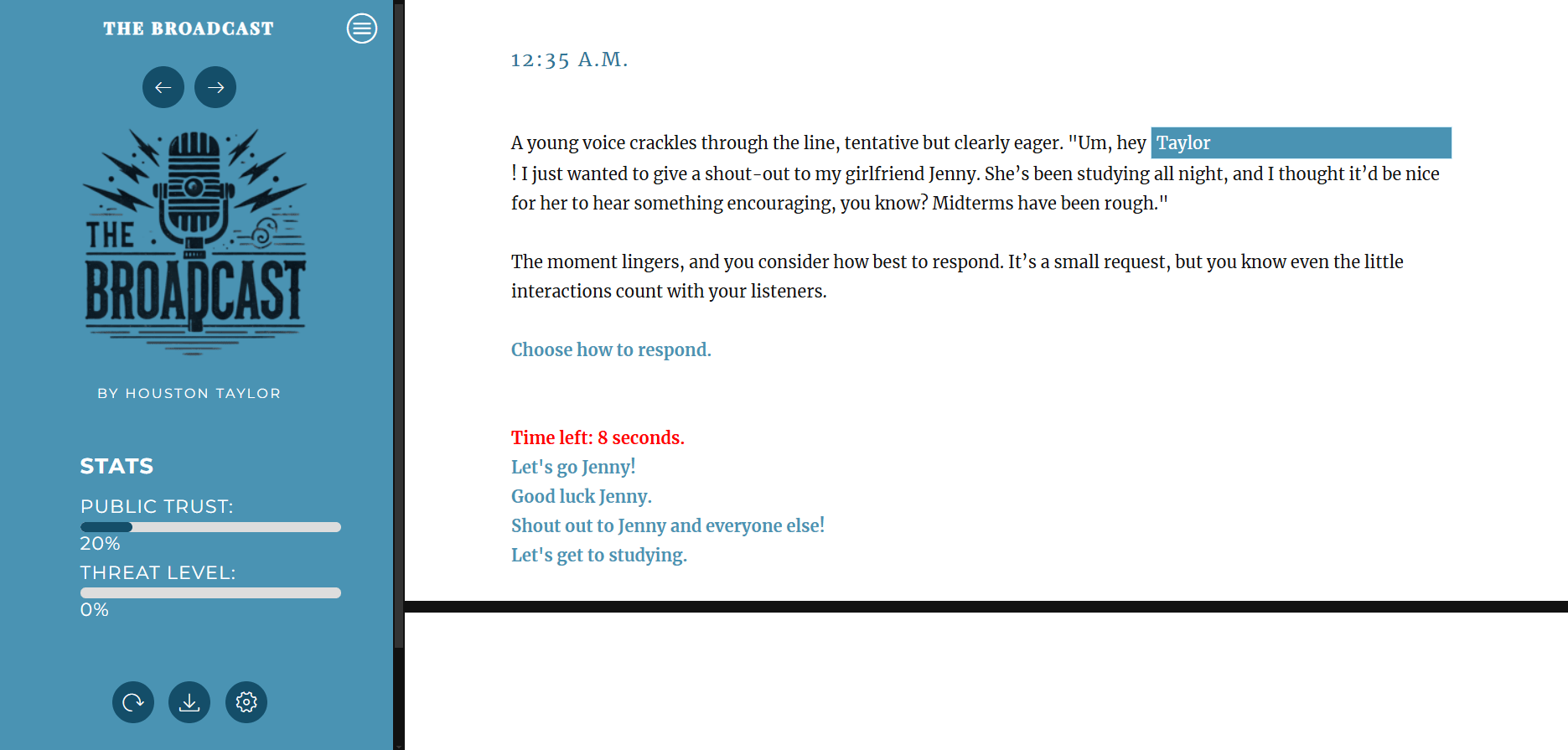
Game Testing
Playtest Session 1:
- Players: 1 (college-aged student in CS 377G)
- Feedback: The player found the personal narrative compelling but wanted more interaction with the community hinted at being affected and more nods at supernatural elements before they occurred. This stage of the game had collectible tokens that changed the ending and could be gathered by helping nature in some way, which the player liked.
- Changes Made: Ported game to Twine, added more hints to supernatural involvement in the writing of the story with a more eerie feel. Cut story aspect of traveling home for time purposes.
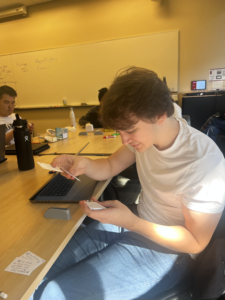
Nils playing an early prototype of Beneath the Canopy
Playtest Session 2:
- Players: 3 (2 college-aged students in CS 377, 1 college-aged student studying symbolic systems)
- Feedback: The choices felt grounded and it was interesting to meet and build a relationship with the friend, but players were limited by a lack of choices. It was also a bit restrictive to only be able to explore each area of the player’s parent’s home one time.
- Changes Made: Realized the extent of the interactions players would want to do would either work better in parser fiction or take longer than this project permits to flesh out. Shifted focus to the radio broadcast, creating a platform for players to engage with the town’s broader story.
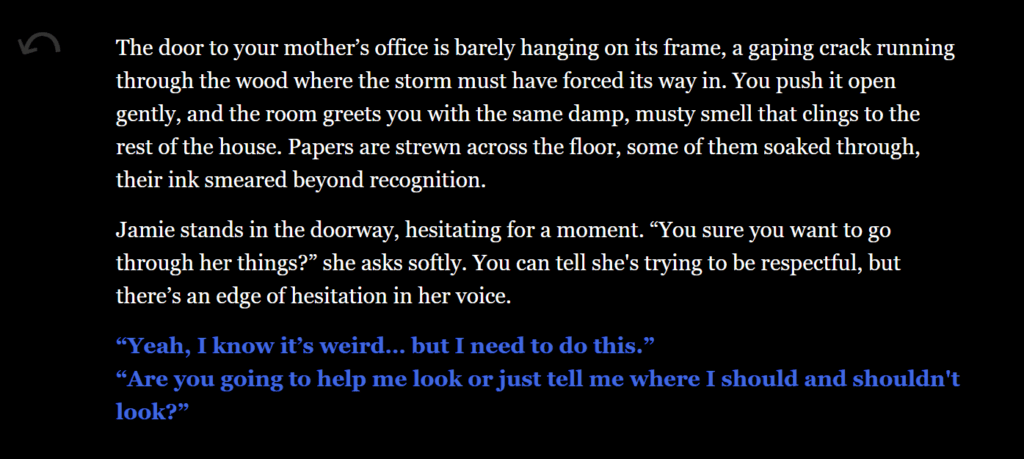
Playtest Session 3:
- Players: 1 (college-aged student studying aero/astro)
- Feedback: The new format was well-received, with suggestions for more visible consequences of choices and a tighter narrative flow. The player expressed interest in there being some form of challenge other than just selecting an answer. She was also a bit confused by which options would change public trust positively and which would do so negatively, as it was not immediately clear.
- Changes Made: Added a visible progress tracker and refined choice impacts for greater player immersion and understanding. Started working on timed choices to add challenge to the game.
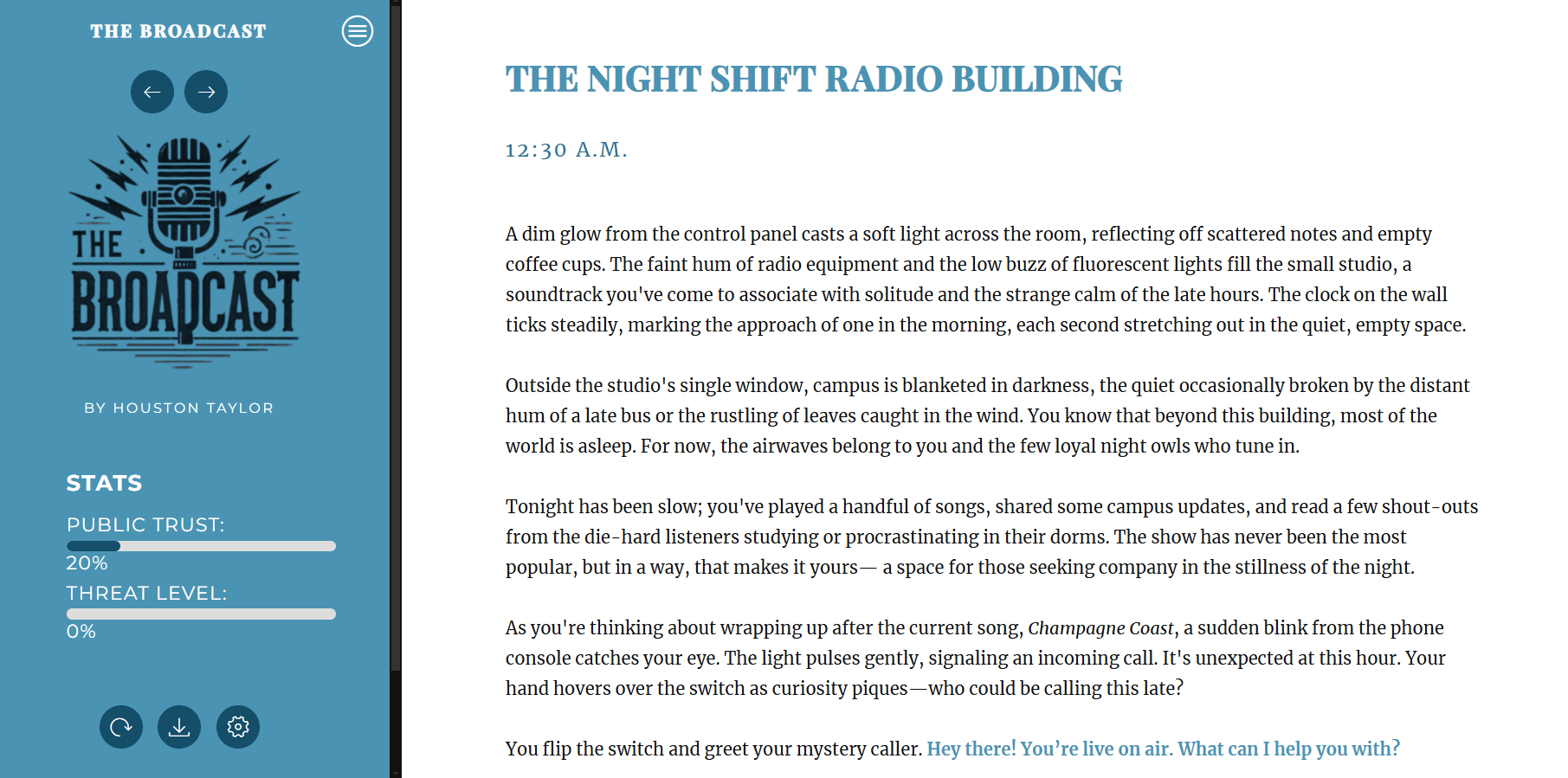
Playtest Session 4:
- Players: 3 (1 college-aged student studying economics, 1 college-aged student studying computer science, 1 woman in her 50s)
- Feedback: Valuable insights on improving choice clarity and narrative pacing. Some bug fixes for connections if the player runs out of time on a choice. Overall positive feedback!
- Changes Made: Enhanced branching dialogue to ensure player choices felt impactful and cohesive. Fixed bugs.

I will have a few people playtest the final version on Twine and ensure everything works and is engaging.
Reflection
The transition from a personal quest to a community-driven narrative was tough but necessary. Initially, the game aimed to explore the emotional fallout of discovering a family’s complicity in environmental destruction. However, once I realized the concept did not accurately send the message of corporate and powerful stakeholder involvement that I wanted it to, I pivoted. The pivot to The Broadcast allowed for a richer, more interactive narrative, emphasizing the power of individual voices in influencing societal change.
Through this process, I learned the importance of adaptability in game design. The shift to a radio broadcast format not only expanded the narrative scope but also made the game more engaging and impactful. In future projects, I would explore incorporating player feedback earlier in the design process to refine the narrative and mechanics more efficiently and start earlier to accommodate the new branches that I inevitably decide to add. I also faced some hardship trying to playtest with people while sick, but got back on track and ended up sending it to people for feedback.
Conclusion
The game’s design journey showcases a significant pivot inspired by player feedback. Initially, the focus was on the protagonist’s personal struggle and family secrets. The pivot to a radio broadcast format provided a broader canvas for exploring societal issues, allowing players to engage with the community and influence public opinion dynamically.
The game aims to provoke thought about the role of media and individual responsibility in the face of corporate and environmental crises. By intertwining personal loss with broader societal stakes, The Broadcast invites players to reflect on their moral choices and the power of truth in shaping public perception. The emotional depth and interactivity ensure that players care deeply about the characters and the outcomes of their decisions.
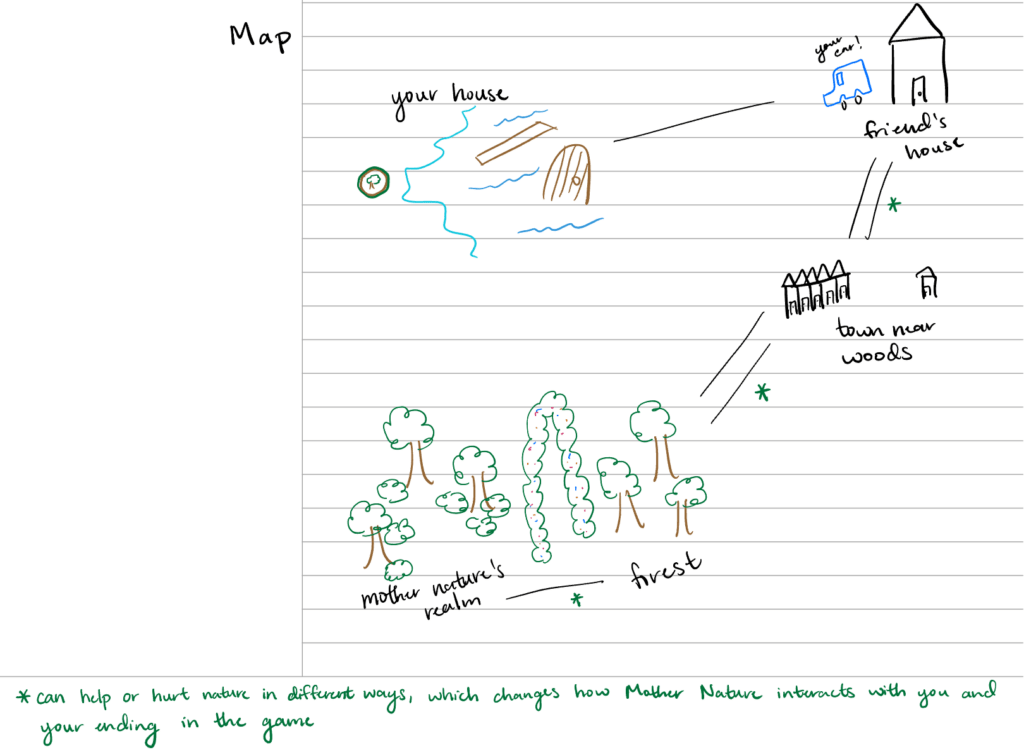


Hi Houston, here’s my feedback on your game!
What values you see in the game, and how they are reflected in the choices made by the game designer?
Refer to the “Values at Play” reading.
Connection – your goal is to build public trust in your program, and you achieve that via authenticity with and care for your audience.
How well did the game get you to care about the given topic or cause?
5/5
The writing was super compelling! I felt really connected to the narrative, especially because of all of the care put into describing locations, giving the player character some personality, etc.
How well did the game’s use of the medium fit the story?
5/5
I quite like the little touches of inline interaction e.g. the textbox where you entered your name, customizing your character. It felt like a super natural way of integrating those player choices into the medium. I also thought having the immediate feedback from the progress bars for Threat and Public Trust were really effective at getting me to care about the game.
Did it have choices that were interesting and consequential to you? (Did any make you really stop and think?) Why?
Yes, I found myself considering frequently whether my decisions would raise my public trust. I think it’s a goal that a player is inherently motivate to achieve, but also the way you introduce the premise and player character with such personality really immersed me in the role of small-time broadcaster.
At least 1 thing you appreciated or thought was awesome
The game made me feel really smart when I chose an option that raised my public trust lol. I think you do a good job of writing feedback that made me think “Oh yeah, I’m a good radio host 😎”.
At least 1 thing you think they could improve on, if they were to turn it into their P4 project
I ran into a few code errors in the story, e.g. after deciding to rush to the studio when I got the hurricane notice it looked like some code got interpreted as text and displayed in the paragraph. Also (and this is a general challenge with adventure games), sometimes I felt like the text describing each choice didn’t exactly convey what my character would say or do. I’m thinking in particular about the first choice when a caller asks to shout out their girlfriend. I think some additional playtests would help work out those little papercuts. Lastly, I felt it was a little odd for the character to dig right into the corporate files right in the middle of the storm, especially since the company is introduced right before then. I think it’s a choice that could make more sense if you introduce the company earlier in the story as like, a disliked town institution or something and/or you give the player the choice to skip reading the attachments for now.